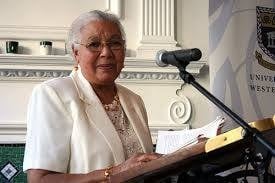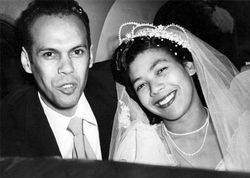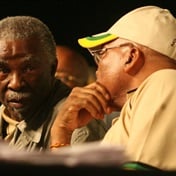
Blanche La Guma, who died on Thursday aged 95, was one of the most unacknowledged veterans of the anti-apartheid struggle. A midwife, she was principled, dedicated and intensely loyal. She gladly lived in the shadow of her writer husband Alex who died and was buried in Cuba in 1985.
One of her proudest moments in recent years was when, in 2015, she launched a collection of Alex La Guma’s writing at the Montagu Literary Festival.
The ironic title that she insisted on, In the Dark, with My Dress on Fire, summed up her work in the shacklands of Cape Town in the 1950s.
READ: Revolt of words shot through with black power
In the midst of delivering a baby in a “pondokkie” during a storm, the wind blew over a candle that set her dress alight. With one hand she continued the delivery as she swatted out the flames with the other.
“But I always played stupid,” she constantly claimed. It was an act the police almost certainly were not taken in by. She also substituted for Alex, banned and very much a marked man in 1961, when she was one of the two Coloured Peoples Organisation (later, Congress — CPC) delegates to the secret nighttime ANC alliance meeting where the decision was made to start an armed struggle. The meeting, in Stanger north of Durban, was with the then ANC president, Chief Albert Luthuli.
READ: Book Review: Bury me at the market placeBlanche never wrote about that meeting “which went on all night”, with Nelson Mandela making passionate arguments. And, even to close friends that she confided in, she would give few details other than to mention that Luthuli had said he would not oppose the armed struggle, but that it could not be an ANC project.
Under constant surveillance and restricted by house arrest, the La Guma family, Blanche and Alex, and their sons, Eugene and Barto, went into exile in the UK in 1966. With the ANC and the struggle in the doldrums, Blanche worked first as a midwife and then in the circulation department of the Soviet Weekly magazine.In the wake of the 1976 student uprising world interest again focused on South Africa and the ANC began a major diplomatic initiative. In 1978 Cuba was prepared to accept and support an ANC chief representative (effectively an ambassador). Alex was nominated by the ANC, with Blanche as his assistant. In 1978 they moved to Havana.At that time, Cuba was also offering scholarships to the children of exiles who had fled South Africa in the wake of 1976. “Auntie Blanche” became a mentor, friend and sometimes, stern lecturer to hundreds of students.
READ: Biko's legacy lives on and will grow in SA and AfricaThe “high days” - parties at the South Africa residence - also became renowned. At these Blanche would usually be serenaded by Alex singing The lily of La Guma to the tune of Stanley Holloway’s Lily of Langua. And while in public she never voiced criticism of Cuba, she had concerns, especially about racism and the fact that “foreign currency shops” existed that were also patronised by a Cuban elite.Alex suffered a major heart attack in their Havana home in 1985. He died in the car as Blanche was trying to get him to hospital, a trauma that haunted her. “I always keep asking`: 'could I have got there faster? Did I take the right road?’
Later that year, her 97-year-old mother was ill and Blanche applied on compassionate grounds, to return to South Africa. She received a restricted visa in February 1991, two months after her mother had passed away. But these were the last fading actions of the apartheid security establishment.In 1994 Blanche finally returned home, full of optimism which she always expressed publicly although she became increasingly disillusioned over the years with the way her hoped for “freedom” had progressed. For more than a decade, she was often seen striding along the corridors of the apartment block in which she lived, duster in hand, having taken over maintenance supervision.
Not only would the guests be representative of Archbishop Desmond Tutu’s “rainbow nation”, the music would be provided by a band drawn from musicians who had started their careers in District Six where nurse La Guma had worked. Blanche also decided to mark the occasion by “doing something I’ve never done before”: she commissioned a dress from a designer - in bright red.
It made her night as the District Six band struck up Lady in Red when she stepped forward to welcome everyone.
Later, a few phones started ringing as calls came in from Polokwane in Limpopo where the ANC elective conference was underway and Jacob Zuma had unseated Thabo Mbeki.That news failed to dampen the spirits at the Kelvin Grove. It was obvious that Blanche had made her point. And, in subsequent days, as she remarked:
“I suppose it’s just a matter of aluta continua.”




 Publications
Publications
 Partners
Partners










